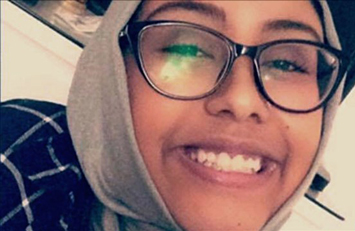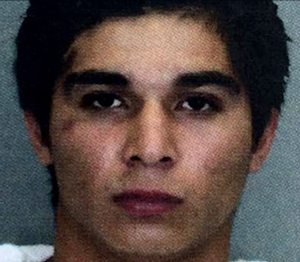One year marks brutal slaying of Muslim teen
By Nisa Islam Muhammad -Staff Writer- | Last updated: Jun 20, 2018 - 2:50:17 PMWhat's your opinion on this article?
Family, friends of Nabra Hassanen still seek justice and vow to keep her memory alive

Nabra Hassanen, 17-year-old Virginia girl who was found murdered.
|
Mr. Torres, charged with Nabra’s capital murder and rape, according to court motions, had significant cognitive limitations, poor memory and severely impaired judgment. He is also functionally illiterate and does not have a high school diploma.
Executing a person with serious intellectual disabilities, according to the Supreme Court, violates the Eighth Amendment’s ban on cruel and unusual punishment. To remedy this courts usually appoint psychologists to evaluate defendants’ intellect.
Defense lawyer Joseph Flood explained that Mr. Torres was born and raised near an active gold mine in El Salvador where toxins, including arsenic and mercury, seeped into the soil and groundwater and, according to a neuropsychologist, he is “likely intellectually disabled.”
Court motions filed by his defense attorneys explain that they want an expert to determine their client’s intellectual abilities and a neurotoxicologist to examine his brain development.
The judge appointed a neuropsychologist and neurotoxicologist at the May 24 hearing despite the prosecutor’s objections who called the request “neuro-witchcraft.”

Darwin Martinez Torres, a suspect in the murder of a 17-year-old Muslim girl.
|
For Rafikah Smith, mother of three, the news was shocking. “He should get the death penalty,” she told The Final Call. “What he did was unspeakable. He knew exactly what he was doing. He was capable enough to follow those kids with a baseball bat and kill Nabra. What was his problem then? This is ridiculous. It’s still so sad.”
“This incident bothers me on so many levels. He is a MS-13 illegal thug who raped and beat a darling young girl to death. I pray for her parent’s strength and resolve as this county tries to look for some sort of justification for what he did,” wrote Matthew as a comment to the news of the judge appointing experts to examine Mr. Martinez Torres in the Louden Times-Mirror. Though Mr. Torres was in the country illegally, police have stated he was not a member of the violent gang MS-13.
Ramadan is a 30-day observation of increased prayers, fasting and charity work for Muslims all over the world. On June 18, 2017, for Nabra, it was just supposed to be a trip to get something to eat with friends before fasting started at dawn. On their way back to the masjid (Islamic place of worship), they encountered Mr. Torres in his car and a dispute occurred between him and one of the boys in the group. Mr. Torres shouted at the teens and they scattered.

|
While community members have said her death was fueled by a bias against Muslims, police say Torres’ rampage was fueled by road rage. “The police can say whatever they want, but I believe with all my heart that it is a hate crime,” Mohmod Hassanen, Nabra’s father, said in comments to media.
One year later the Muslim community is still in mourning but moving ahead. Families exercised more caution with their children at night during prayers this Ramadan which ended on June 14.
“The family is still struggling. This was a major loss for this family and this community,” Jumana, of Pious Projects of America, told The Final Call. She heard about what happened and reached out to the family through a cousin. She has been working with Nabra’s father and other families who have suffered similar losses.
Pious Projects, located in Bridgeview, Ill., is a non-profit that connects donors with worthy projects. Soon after Nabra’s death the group set up an online campaign to raise $25,000 to build seven wells and a mosque in Nabra Hassanen’s name in Mali, Africa. Donors exceeded that goal and raised $45,000.
“We wanted to give back to the community for all they gave during this hardship,” said Jumana. They produced a documentary that can be seen online to showcase the work of Pious Projects in Nabra’s name. “I enjoy basically speaking with the families and trying to guide them through their heartbreak and bring them something positive in the end,” she explained.
The documentary was screened April 28, in Nabra’s community of Reston, Va. It is called “In Honor of Nabra” and shows the work of Pious Projects to build a beautiful masjid and the seven wells in her name.
“Nabra was my friend. She was really nice and funny to be around. She always made sure her friends were taken care of before herself. Thank you Nabra for always being there for me because I know if you were here it would be much better, but you are in a good place now so rest in peace,” Samah Mohamed said in remarks to media.
At the screening Jumana explained, “Our role is to show the community what we were able to build with more than $45,000 that we fundraised in Nabra’s honor. Our team went to Mali, Africa to build a mosque and seven water wells. In the documentary, you are going to see the struggles the Mali community goes through and how building the mosque and water wells, in Nabra’s honor, was able to help them. In the afterlife, Nabra will have ongoing charity in her name.” The documentary purposely doesn’t mention in detail what happened to Nabra other than she was murdered.
The documentary does show the impact of the new wells and the masjid on the community in Mali. Imam Al Moustafa Sonogo explained to the packed audience at the masjid opening that they will remember Nabra among the great Muslim women murdered in the name of their beliefs and that she will be awarded martyrdom.
“This masjid is a living charity in her name, she is a hero of Islam, a martyr of Islam,” he said. Later as they opened the new wells he said, “We don’t have much to give except dig this well in your name, so that its reward may reach you.” Pious Projects is not the only one doing something in Nabra’s name.
“Her friends are also giving out bags of food to the homeless in her name once a month,” said Jumana.
INSIDE STORIES AND REVIEWS
-
-
About Harriett ... and the Negro Hollywood Road Show
By Rabiah Muhammad, Guest Columnist » Full Story -
Skepticism greets Jay-Z, NFL talk of inspiring change
By Bryan 18X Crawford and Richard B. Muhammad The Final Call Newspaper @TheFinalCall » Full Story -
The painful problem of Black girls and suicide
By Charlene Muhammad -National Correspondent- » Full Story -
Exploitation of Innocence - Report: Perceptions, policies hurting Black girls
By Charlene Muhammad -National Correspondent- » Full Story -
Big Ballin: Big ideas fuel a father’s Big Baller Brand and brash business sense
By Bryan Crawford -Contributing Writer- » Full Story






 Click Here Stay Connected!
Click Here Stay Connected!








